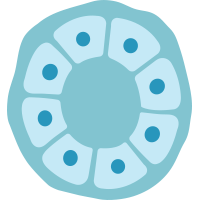
Mammary Cell News
Mammary Cell News is an online resource covering the latest research into breast cancer and mammary cells.
CHD8 Interacts with BCL11A to Induce Oncogenic Transcription in Triple Negative Breast Cancer
[EMBO Journal] Scientists described their approach for the identification of TNBC-specific protein–protein interactions focusing on the oncogene BCL11A.
G Protein-Coupled Estrogen Receptor Reduces the Breast Cancer Cell Survival by Regulating the IRE1α/Mir-17-5p/ TXNIP Pathway
[The Journal of Steroid Biochemistry and Molecular Biology] Investigators explored whether G protein-coupled estrogen receptor 1 can induce the UPR response in the SKBR3 cell line through estrogen receptor and inositol-requiring enzyme 1 alpha activation, and to assess whether this response leads to cell survival or cell death.
Tubeimoside I Inhibits the Growth of Triple-Negative Breast Cancer via the NR3 C2/PI3 K/AKT Signaling Pathway
[Naunyn-Schmiedebergs Archives of Pharmacology] Scientists used a comprehensive approach involving bioinformatics analysis and in vivo and in vitro experiments to investigate the effects of TBMS1 on triple-negative breast cancer (TNBC) cells and elucidated the underlying molecular mechanisms involved.
Palbociclib Stimulates CD8+ T Cell Response in Triple-Negative Breast Cancer via Regulating Phosphoglycerate Dehydrogenase
[Anti-Cancer Drugs] Researchers explored the effects of palbociclib (PALB) on triple-negative breast cancer. An in vivo assay was applied to determine the effects of PALB on breast cancer.
PROteolysis TArgeting Chimera (PROTAC) Estrogen Receptor Degraders for Treatment of Estrogen Receptor-Positive Advanced Breast Cancer
[Targeted Oncology] The authors describe the unique mechanisms of action of a new class of drugs called PROteolysis TArgeting Chimera estrogen receptor degraders.
Zetagen Therapeutics Announces Successful Completion of Enrollment in Phase IIa Clinical Study of ZetaMet™ (Zeta-BC-003) Metastatic Breast Cancer
[Zetagen Therapeutics, Inc.] Zetagen Therapeutics, Inc. announced they have successfully completed enrollment in their Phase IIa study, which will evaluate ZetaMet™ (Zeta-BC-003) in the treatment of spinal metastatic lytic breast cancer lesions.
An Optimized Droplet Digital PCR Assay for HER2 Copy Number Variation in Breast Cancer Based on Multi-Reference Genes
[Applied Biochemistry and Biotechnology] To more accurately and objectively assess the HER2 amplification status of formalin fixed paraffin embedded samples, a droplet digital PCR assay based on multi-reference genes was developed.
Enhancing Photothermal Therapy against Breast Cancer Cells by Modulating the End Point of Gold Shell-Isolated Nanoparticles Using Nanostraw-Assisted Injection
[ACS Applied Materials & Interfaces] Investigators demonstrated that nanostraw-assisted injection enhances the photothermal therapy efficacy of gold shell-isolated nanoparticles compared to the conventional incubation method, as evaluated in human breast cancer cell lines: adenocarcinoma cells and glandular carcinoma cells.
Enhanced Therapeutic Efficacy of Platinum-Doxorubicin Nanoparticles on Colon and Breast Cancer Cell Lines
[Naunyn-Schmiedebergs Archives of Pharmacology] Scientists platinum nanoparticles were synthesized and their potential to improve the efficacy of doxorubicin in cancer treatment was investigated.
Nuclear-Localized BCKDK Facilitates Homologous Recombination Repair to Support Breast Cancer Progression and Therapy Resistance
[Advanced Science] Researchers showed that nuclear-localized branched-chain α-ketoacid dehydrogenase kinase (BCKDK) acts as a modulator of homologous recombination repair, promoting cell resistance against DNA damage-inducing therapy in breast cancer.
Discovery and Biological Evaluation of a Novel and Highly Potent JAK2 Inhibitor for the Treatment of Triple Negative Breast Cancer
[Journal of Enzyme Inhibition and Medicinal Chemistry] Investigators discovered six JAK2 inhibitors using structure-based virtual screening and molecular docking and demonstrated that JNN-5 may be a highly effective and selective antitumor compound for the treatment of TNBC.
SDCBP/Syntenin-1 Stabilizes BACH1 by Disassembling the SCFFBXO22-BACH1 Complex in Triple-Negative Breast Cancer
[EMBO Journal] Scientists demonstrated that SDCBP, a tandem-PDZ-domain protein, stabilized BACH1 by disassembling the Skp1-Cullin1-FBXO22 (SCFFBXO22)-BACH1 complex via a heme/heme-oxygenase-1-independent manner in TNBC cells.
For over a decade, Mammary Cell News has been keeping the global scientific and medical communities informed about the latest research, reviews, and news in the field of mammary tissues. Our editors gather publications on the topic of mammary cell differentiation and characterization, as well as the progression and treatment of breast cancer. We also keep scientists up-to-date on the latest policy changes, job postings, and events.

 Cancer Stem Cell News
Cancer Stem Cell News Cell Therapy News
Cell Therapy News Dermal Cell News
Dermal Cell News Endothelial Cell News
Endothelial Cell News ESC & iPSC News
ESC & iPSC News Extracellular Matrix News
Extracellular Matrix News Hematopoiesis News
Hematopoiesis News Hepatic Cell News
Hepatic Cell News Human Immunology News
Human Immunology News Immune Regulation News
Immune Regulation News
 Intestinal Cell News
Intestinal Cell News Mammary Cell News
Mammary Cell News Mesenchymal Cell News
Mesenchymal Cell News Muscle Cell News
Muscle Cell News Neural Cell News
Neural Cell News Organoid News
Organoid News Pancreatic Cell News
Pancreatic Cell News Prostate Cell News
Prostate Cell News Pulmonary Cell News
Pulmonary Cell News
